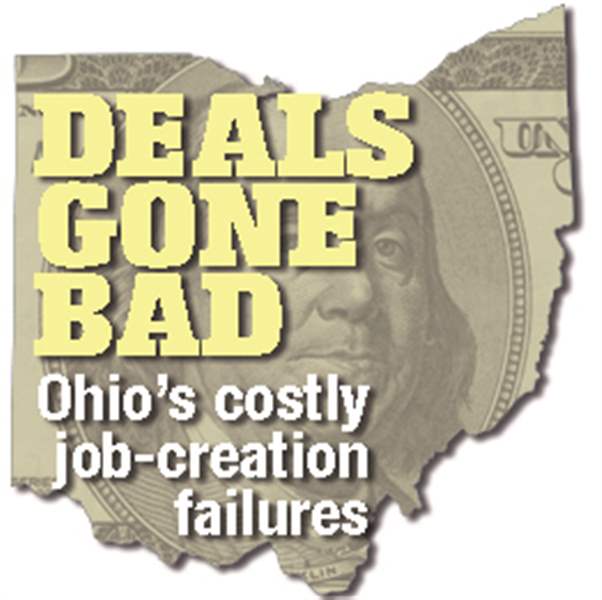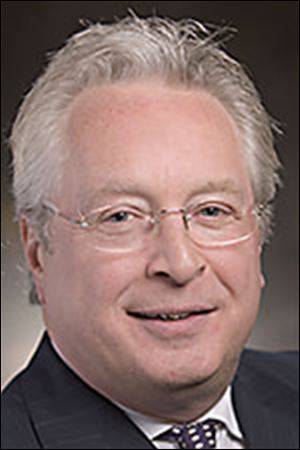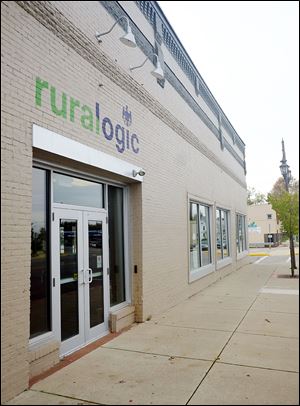
BLADE INVESTIGATION: DEALS GONE BAD
Area towns, state lose bet on tech jobs
Millions in public money loaned, but little is repaid
6/22/2014

Snyder
Corrected version: This story was changed to remove inaccurate information about Isofoton’s billings to state agencies.
In mid-2010, C. David Snyder scoured rural northern Ohio towns in search of easily accessible government funding.
The Cleveland businessman peddled promises of job creation and economic vitality in the aftermath of the Great Recession — promises that spurred officials from Bryan, Archbold, Napoleon, and the state to award Mr. Snyder’s information technology start-up, Ruralogic Inc., more than $1.2 million in loans and grants.
Mr. Snyder, who touted his unfettered access to former Democratic Gov. Ted Strickland’s administration, pledged to create 200 or more IT jobs in Bryan.
The deal sounded like a reprieve from a tepid economic climate, said Dennis Miller, executive director of the Maumee Valley Planning Organization, which processed Bryan’s $350,000, August, 2010, loan to Ruralogic.
“That was at a time when there was not a lot going on economically, and the local political and business leadership in the communities were anxious to stimulate the economy and create jobs,” Mr. Miller said.
RELATED: Copies of invoices related to Ruralogic
Mr. Miller, though, was given pause when Mr. Snyder began shopping the same project to Napoleon and Archbold. Creating 200 or more jobs in each small town would have been difficult, he said.
“It appeared he was trying to assemble as much public funding as possible, and it concerned me about how we could make sure he used the funds in an appropriate manner for each of the projects,” said Mr. Miller, whose organization also processed a $200,000, March, 2011, loan for Ruralogic’s Napoleon office.
Mr. Miller’s concerns were not unfounded.

A Blade investigation revealed that the taxpayer-funded loans granted to Ruralogic for its operations in Bryan, Napoleon, and Archbold have not been repaid, and it’s unclear how most of that money was spent, a review of municipal records shows.
Although Ruralogic, which records show was based in Bryan, included a breakdown of equipment it agreed to buy in its loan contract with Bryan, the company never purchased some of the items on that list. And, despite accepting a $450,000 loan from Archbold, Ruralogic never opened its doors there. Its offices in Bryan and Napoleon are closed.
“As to whether our funds went to equipment, executive salaries, or operating expenses, it’ll take a forensic accountant to figure all that out,” Mr. Miller said.
All three communities are suing Ruralogic. None of them reaped the economic rewards or jobs Mr. Snyder promised.
These issues follow a pattern of financial irregularities at Mr. Snyder’s companies, which either acquired or worked on projects that received more than $28 million in government financing during a five-year period. Most of that $28 million has not been repaid, and all of the businesses involved face allegations that they misappropriated taxpayer or corporate funds.
Last week, a Blade reporter left his business card with a woman entering Mr. Snyder’s Rocky River, Ohio, home and asked for Mr. Snyder to contact him. The newspaper received no response.
Messages left on Mr. Snyder’s mobile phone also were not returned.
Among the issues
The Blade discovered many of Ruralogic’s financial issues by examining municipal, state, and court records.

The Ruralogic office in Napoleon is closed, as is the office in Bryan. An office never opened in Archbold, even though the company received a $450,000 loan from the city.
After reviewing an equipment list Ruralogic included in its loan contract with Bryan, The Blade discovered that the firm never purchased 62 computers for $18,910 from Mainline Information Systems Inc. and did not spend $69,590 for video-conferencing equipment from Netwave Corp. Employees at both companies confirmed they never did business with Ruralogic.
Rick Bolman, Ruralogic’s former IT manager from September, 2010, to December, 2012, said the company never purchased about $127,000 of equipment itemized on the list and called it a “planning document.”
“That list you sent predates my involvement there, and it looks more like a list of potential equipment they wanted to get rather than money that was actually spent,” he said, adding that Ruralogic owes him $27,000 in back pay and retirement contributions.
The Maumee Valley Planning Organization, which processed two loans for Ruralogic, was unaware the company did not purchase some of the equipment listed in its Bryan loan contract, Mr. Miller said. The organization informed its lawyer of The Blade’s findings.
Ruralogic never submitted receipts for its equipment purchases to the Maumee Valley Planning Organization, a review of its loan file shows. Mr. Miller said the organization confirmed some of the purchases through a visual inspection.
“We physically looked at it, but it was a sampling of it,” he said. “We didn’t verify everything.”
A majority of the money loaned to Ruralogic for its Napoleon office — funds that also were processed by the Maumee Valley Planning Organization — was invested in rehabilitating the company’s rented office space. That $200,000 has not been repaid, and Ruralogic vacated that office more than a year ago.
Archbold declined to make Ruralogic’s loan file available to the public.
Isofoton link
Mr. Snyder’s quest for taxpayer funding — and the problems that stem from his handling of that money — extend beyond the municipal loans.

At Isofoton North America in Napoleon, Ruralogic was hired to handle the firm’s finances and acted as the solar-panel plant’s chief financial officer.
A relationship between Mr. Snyder and the chairman of Isofoton North America, a Napoleon-based solar-panel manufacturer that received more than $15 million in state loans, got Ruralogic hired to handle Isofoton’s finances, said Diego Belmonte, Isofoton’s former interim chief executive officer.
Hired in 2012, Ruralogic acted as Isofoton’s chief financial officer, Mr. Belmonte said. Ruralogic aided the solar-panel maker in its acquisition of state funding and dealt with the state agencies that issued Isofoton’s loans, he said.
Ruralogic worked for Isofoton until April, 2013.
State records reviewed by The Blade show that while Ruralogic was handling Isofoton’s finances, copies of the same invoices from 19 different vendors were submitted to both the Ohio Development Services Agency and Ohio Air Quality Development Authority, agencies that loaned Isofoton more than $10 million and $5 million, respectively.
State loan documents required Isofoton to submit multiple copies of invoices to state agencies.
Those invoices totaled more than $1.4 million. For example:
■ $173,720 for Air Force One Inc., a construction contractor.
■ $198,900 for GEM Inc., a specialty contractor.
■ $93,600 for SSOE Group, an architecture, engineering, and construction-management firm.
Economic development officials working under Republican Gov. John Kasich’s administration who were responsible for monitoring how Isofoton’s state funding was spent, refused to comment. Neither Governor Kasich nor his aides have been willing to discuss Mr. Snyder or the state money he or his clients received.
The invoices from the Ohio Development Services Agency included memos that tracked how Isofoton’s state funding was spent. The invoices from the state air authority, however, did not.
Legal action
The Blade provided the air authority with a spreadsheet of the duplicated invoices and asked spokesman Jenny Camper to confirm whether they had been paid. Ms. Camper refused, citing legal advice from the office of Ohio Attorney General Mike DeWine, which is representing the air authority as it tries to collect the funding it loaned to the now-shuttered Isofoton.
Ms. Camper said the air authority generally asks for all invoices related to an economic development project and released this statement:
“The company [borrower] pays all invoices.”
Issues with Isofoton’s taxpayer funding don’t end there.
A June, 2013, email included in a $64,830 lawsuit brought against Isofoton by construction contractor Air Force One states the solar firm misused its state funding.
“Cash is not available to pay us right now. The money that was paid by the state of Ohio against our invoices was used for operating funds instead of to pay us what was due,” the email from Air Force One to Isofoton states.
State loans, like Isofoton’s contract, often stipulate that taxpayer financing must be spent on itemized lists of equipment. Any other use of that funding would be a violation of the loan agreement.
A review of Isofoton’s state funding records shows the Air Force One invoices that were submitted to state officials were billed through Ruralogic.
“The money that was used for the project was used to cover payroll and other operating costs of the business rather than the construction of the facility,” said Greg Guy, chief executive officer of Air Force One.
Jim Armstead, a Ruralogic director from 2010 to 2013, hung up the phone when a Blade reporter called him to ask about the Isofoton project. Tish Wityk, a former Ruralogic employee who is named on some of the Isofoton invoices, declined to comment.
Ruralogic CEO Joe Burmester did not return a call seeking comment.
Isofoton denied misappropriating its state funding in a June, 2013, email that was included in the lawsuit.
In a written statement to The Blade, Michael Peck, Isofoton’s North American chairman, denied any wrongdoing on behalf of Isofoton and said “Ruralogic played no role in acquiring state financing.”
Mr. Peck would not agree to a phone interview.
The Ohio Development Services Agency and Isofoton provided audits of Isofoton’s state funding to The Blade, but those documents only examined funds loaned by the Ohio Development Services Agency. Isofoton’s $5 million loan from the state air authority is not mentioned in that paperwork.
A public records request for the air authority’s loan file on Isofoton did not contain an audit, and Ms. Camper would not comment on whether one was conducted.
“Certainly, it raises a lot of questions if two state-related entities are being asked to accept the same documentation for different spending,” said Jeff Jacobson, vice chairman of the air authority.
A political player?
Mr. Snyder was able to ingratiate himself with economic development officials and businesses by selling himself as a player in state politics.
Mr. Snyder routinely touted his access to Governor Strickland’s administration while Ruralogic was negotiating its loan with Archbold, said Dennis Howell, Archbold’s village administrator.
“He’s just a name-dropper,” Mr. Howell said, adding, “I know that he would use his relationship with the governor’s office as a talking point.”
A public records request filed by The Blade turned up hundreds of emails and calendar entries that showed Mr. Snyder was in frequent contact with high-level staff members of Governor Strickland’s administration, including Chief of Staff John Haseley and Pari Sabety, Office of Budget and Management director. The communications span the entirety of Governor Strickland’s term and range from personal matters to providing taxpayer funding to Mr. Snyder’s companies. They do not mention Mr. Snyder’s mounting professional and legal troubles.
One January, 2008, email shows that Mr. Snyder — who, along with his wife, donated $21,000 to Governor Strickland’s 2006 campaign and threw a fund-raiser for his re-election bid — was scheduled to meet with Mr. Strickland at the governor’s residence.
“Would Ted be available on [Saturday] Feb. 2 for a get-together at the residence with Dave Snyder and me? One hour. Alternative Saturdays?” the email, written by Mr. Haseley, states.
Follow-up emails also requested an hour of “cushion time” after that meeting.
Governor Strickland said he did not have a favorable impression of Mr. Snyder and that his administration did not grant him special favors.
“If you mean dealings that were unethical or out of the normal business interaction, absolutely not,” Governor Strickland said. “To my knowledge, no one benefited because of those kind of deals. Certainly, David Snyder was not someone I would have tried to go the extra mile with in terms of being helpful.”
Issues involving Mr. Snyder and taxpayer dollars extend from Governor Strickland’s term well into Governor Kasich’s tenure.
Trail of trouble
Although Mr. Snyder was adept at getting his hands on taxpayer funding, trouble followed each of the deals he was involved with.
In five years, his companies either acquired or worked on projects that received more than $28 million in local and state financing. Each of those projects tanked.
The Ohio Development Services Agency placed a $1.1 million loan it granted to Mr. Snyder’s Cleveland IT company, Attevo Inc., in default after being questioned by The Blade in October about whether that money was misspent. Although Mr. Snyder and his companies faced numerous legal and tax issues prior to receiving that funding, Ohio’s economic development records didn’t mention those problems.
Following the publication of a Blade investigation last year, the U.S. Department of Labor filed a lawsuit in November against Mr. Snyder, Ruralogic, and Attevo for acts of fraud or dishonesty.
Attevo was hired by Willard & Kelsey Solar Group — a defunct Perrysburg solar-panel manufacturer that is being sued by the Ohio attorney general for fraudulently spending its state loans — when the firm was trying to acquire more than $10 million in taxpayer financing. The Blade discovered the connection between the two businesses by reviewing the emails of Willard & Kelsey’s former chief executive officer.
Although the state streamlined its economic development efforts under JobsOhio, a nonprofit agency that was Governor Kasich’s creation, the organization is not subject to public records laws. Problems, like those of Mr. Snyder and his companies, are now more difficult for the public to see.
Kris Turner can be reached at: kturner@theblade.com or 419-724-6103.